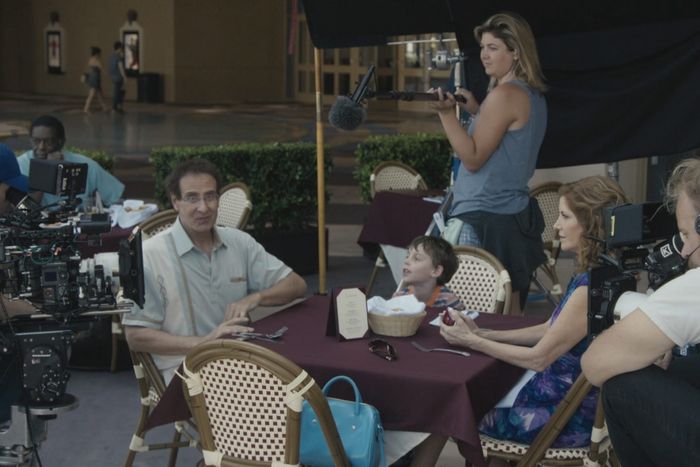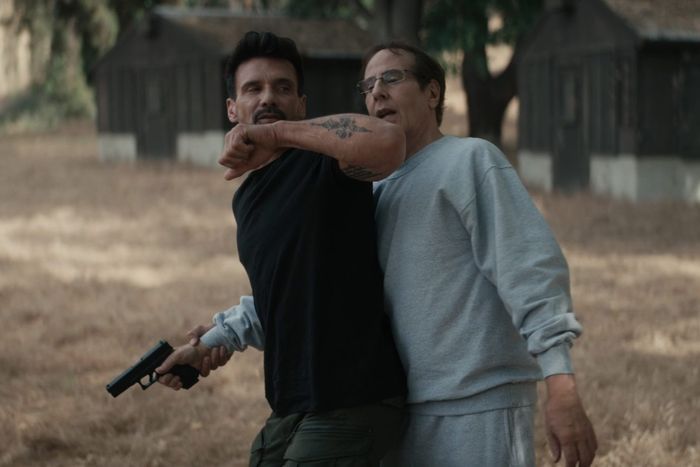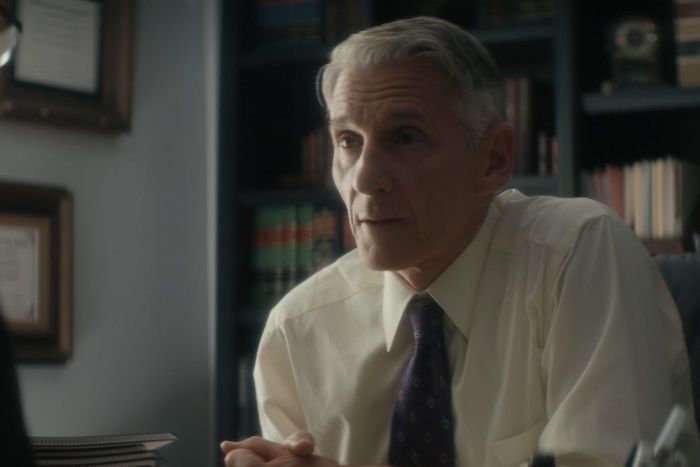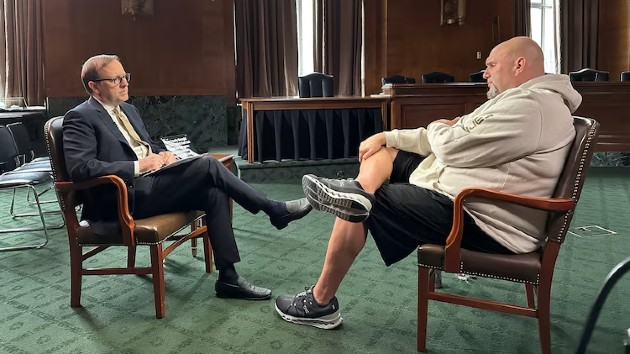Seven Actors Discuss Their ‘Paul T. Goldman’ Experience
Written by on January 23, 2023
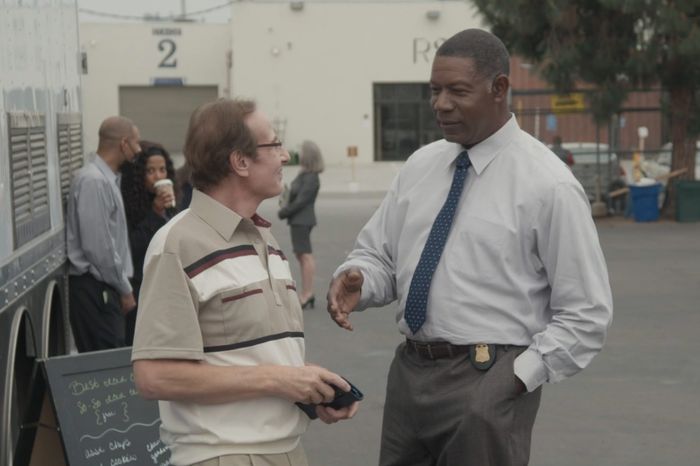
Dennis Haysbert with Paul Finkelman on Paul T. Goldman.
Photo: Peacock
There’s a moment in the second episode of Paul T. Goldman — Peacock’s surreal docu-dramedy series about Paul Finkelman’s search for justice after allegedly falling victim to a scam perpetrated by his second ex-wife — when Ludwig Manukian, an actor who appears briefly in the show, expresses his misgivings about Finkelman’s outsize role in the series. “He’s the main guy?” he asks in disbelief. “Wow. That’s weird.”
For any one aspect to stand out as especially weird in a show as formally inventive and tonally adventurous as Paul T. Goldman is an achievement. Directed by Borat Subsequent Moviefilm director Jason Woliner and produced by Seth Rogen and Evan Goldberg, the six-episode limited series features an inscrutable blend of true crime and true-crime satire, documentary storytelling, and dramatized reenactments of Finkelman’s life written by and starring Finkelman (under his adopted pseudonym Paul T. Goldman). At the center of this tangled web lies Finkelman, a middle-age man whose offbeat demeanor and peculiar mannerisms make him feel like a foreigner from a country that does not exist.
In 2012, Finkelman got Woliner’s attention by tweeting relentlessly at him and dozens of other movie directors about producing the screenplay he’d written, based on the books he’d written (under the separate pen names Paul T. Goldman and Ryan Sinclair) about his life — or, at least, his version of it. Woliner agreed, but on the condition that he could tell the story his way. His vision was to produce Finkelman’s script as written — even when certain details seemed fantastical or exaggerated — while shooting a documentary about their filmmaking process at the same time. The show’s cast would appear in both elements, with footage spliced together to form the final product. And if any of this sounds confusing, television networks unsurprisingly raised similar objections. The show took over ten years to find a home and was produced in fits and starts over that period. Woliner began shooting interviews with Finkelman in 2012 and filmed a pilot presentation in 2017, then bided his time until Peacock signed on in 2022 and he could resume production. The finale, which was released on January 22, includes scenes from the recent Peacock premiere screening in Los Angeles as well as Finkelman’s Jimmy Kimmel Live! appearance alongside Rogen.
On paper, few actors would describe Paul T. Goldman as their dream project. It’s an impossible-to-market, low-budget mindfuck based on a clumsy script and starring a first-time actor who, at times, seems like he’s being taken advantage of. But it’s brimming with recognizable faces from the Finkelverse that will make viewers point at their screens and say, “That’s so-and-so from that thing!” Actors Melinda McGraw (Mad Men, The X-Files, The Dark Knight) and Christopher Stanley (Argo, Zero Dark Thirty, Mad Men) play significant roles as Paul’s ex-wife and Finkelman’s lawyer, respectively. Frank Grillo (Captain America: The Winter Soldier, Zero Dark Thirty, Billions), Dennis Haysbert (24, Heat, spokesperson for Allstate insurance), Josh Pais (Ray Donovan, The Dropout, Law & Order: Special Victims Unit), and Dee Wallace (E.T., Cujo, The Hills Have Eyes) have recurring roles, while Jake Regal (The Sex Lives of College Girls, Hollywood), a relative newcomer, has the unique experience of portraying Woliner while also being directed by him.
McGraw on set with Finkelman in the series.
Photo: Peacock
How these actors were pitched on this project varied depending on when they came aboard. McGraw, who participated in the 2017 pilot, says Woliner sold her on the project over the phone even though she couldn’t fully picture what the show would look like at the time. Actors who signed on later were sent a sizzle reel of footage to head off any confusion, but it often required a personalized note or phone call from Woliner before they agreed to the part. When Wallace got the offer to play Finkelman’s pet psychic, Terri Jay, scheduling conflicts forced her to choose between Goldman or a pilot starring Kerry Washington, but the originality of Woliner’s project tipped the scales in its favor. “It was a real battle,” Wallace says. “But I just thought, This is so unique, and if it goes, it’s going to go really big.” Haysbert echoes this, noting that his role of FBI Agent Portman piqued his interest because the project seemed like a refreshing change of pace from his usual day-to-day. “It certainly wasn’t for the money,” he says with a laugh.
Having a camera crew on set documenting the show’s production was a first for most of the cast, and thanks to this additional layer of storytelling, Paul T. Goldman’s audience can watch how the actors react to Finkelman in all of his eccentric glory. Their unscripted interactions vary from warm, like McGraw showing him the ropes of working on a television set, to awkward, like Goldman attempting to commiserate about his dating experiences with action-movie star Grillo and discovering they have little overlap. (“It’s the worst!” Finkelman declares with conviction. “I mean, I’m having kind of a fun time,” Grillo replies.) Grillo remembers the time he and Finkelman spent together fondly. “He’s very Forrest Gump–like,” he says. “Whether you’re laughing at him or laughing with him, because of who he is, there’s never any malice or venom — you’re just laughing.” He’s not the only actor in the show’s cast to question whether Finkelman is a knowing participant in the laughs he generates.
Grillo in Paul T. Goldman.
Photo: Peacock
Naturally, these fascinating interactions spilled over into moments that weren’t caught on-camera. After they wrapped the pilot, McGraw says Finkelman gave her a copy of his book, Duplicity, with a touching inscription that read, “Thank you for giving me the sweet Audrey I never had.” (Finkelman’s ex-wife did not agree to participate in the series, so her character was given a pseudonym.) The two have maintained a friendly texting relationship since. “He texted me when he saw the show’s billboard on Sunset Boulevard,” she says. “He tells me about his life in Florida and the alligators. He’s the sweetest guy. What you see is what you get, and that’s a beautiful thing in this world.” Pais — whose character, Ryan Sinclair, is a fictional author Finkelman invented for himself because “James Bond wouldn’t write the James Bond books himself” — notes that after filming together, the pair shared a surreal car ride back to their hotel that felt like “the scene was continuing.” Pais asked him to clarify a few specific details of his story, and Finkelman launched into a retelling of his entire life’s saga in full dramatic fashion. “I texted Jason later,” Pais says, “and I was like, ‘We should have filmed that.’” Later, at the show’s premiere, he says Finkelman presented him with a picture he’d snapped of the two of them while filming and asked him to sign it, and then the pair of them took a picture holding that picture. “Jason said, ‘In a year from now, we’ll take another picture of the picture of the picture.’ Everything about it is so endlessly meta.”
Contending with Finkelman as a first-time creative presented its own unique set of challenges for the actors. They had to be patient, understanding, and flexible — all while shooting their scenes on rapid timelines thanks to the shoestring nature of the show’s production. What Finkelman lacked in natural acting ability and sophisticated writing chops, he made up for with raw instincts and enthusiasm. Wallace framed this as a creative advantage of sorts, in that it allowed him to be “more honest” and “not bring his brain into it.” Sometimes, this led to him being a worse scene partner, like when he’d instruct McGraw to tone down the nuance in her portrayal of Audrey because he wanted her to appear more “obviously bad.” “I wanted it to look like, Well, anyone would have been taken by her,” McGraw remembers. “He was like, ‘No, there were red flags all over the place.’”
Other times, it made him a ruthless collaborator, like when he tried to get Regal fired because he wanted Woliner to appear in the show’s dramatized scenes himself. “I found it funny,” Regal recalls. “I realized that I wasn’t going to be fired and that it was just a thing that was unfolding within the confines of this exploratory space. But there’s something human about seeing another human being saying, ‘I don’t like this person. Can we get rid of him?’” At least one scene with Stanley — in which Finkelman cast aside the script to pretend like he was receiving supportive texts from an imaginary live audience watching the show in real time — evaded logic altogether. “He’d been bitten a little bit by the fame bug,” Stanley says he realized while filming this scene. “I was discovering that he very much wanted this show to be an interactive experience, and for that to happen in the middle of a scene was a little bit surprising and jarring. But at the same time, it’s Paul. All you have to do is meet him for five minutes and you’ll know that that’s who he is.”
Stanley reacting to Finkelman in the series.
Photo: Peacock
Overwhelmingly, the cast speaks positively of their experiences with Finkelman, even though the adjectives they use to describe him — childlike, authentic, pure, naïve, off-center, human, sincere, sweet, vulnerable, funny, himself — do not necessarily make for a flattering word cloud. “We’re not making fun of this guy, right?” McGraw remembers asking Woliner at the outset of their first phone call. “No, we’re trying to tell his story,” he responded. “But it’s also the story of him trying to find what he needs.” For most of them, it was the potential to offer Finkelman catharsis that allowed them to set aside any concerns they had that he was being taken advantage of and commit fully to its execution.
In fact, as production went on, some actors began to question whether the power dynamics were as one-sided as they initially seemed. A lot of everyday people are spurned by immoral partners, but almost none of them get the opportunity to “turn their pain into profit,” observes Haysbert. “Think about how hard it is to get anyone to listen to your problems.” So what is it about Finkelman that allowed him to transform himself into one of the rare few? Was it will, tenacity, and the law of manifestation? Maybe. “Was he fucking with all of us all along?” asks Grillo. Perhaps. McGraw’s theory is a little different: “There’s this archetype of the fool that’s wiser than everyone, and I think Paul has that quality.”
watch avatar the way of water full movie
watch avatar the way of water full movie
watch avatar the way of water full movie
watch avatar the way of water full movie
watch avatar the way of water full movie
watch avatar the way of water full movie
watch avatar the way of water full movie
watch avatar the way of water full movie
